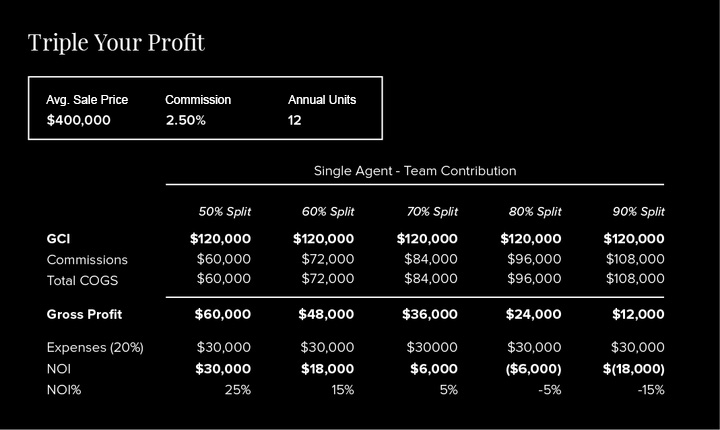When the real estate market takes a downturn, profitability becomes crucial to agents and real estate teams. Many team leaders heighten their efforts to:
- Increase their social media presence and digital marketing strategies to find potential clients
- Revitalize email marketing campaigns to keep their business top of mind with clients
- Prioritize lead generation to find potential customers and keep pipelines full of hot leads
- Reduce administrative expenses wherever possible
Sometimes, marketing efforts and expense reduction alone don’t always result in profit. We’ve found that the most successful team leads build profitable businesses because they consistently assess their business models for profitability.
While this process takes time, it’s the best way to ensure your business is on track to reach and exceed sales goals, no matter the market trends. Here are the five steps our top-performing teams take to maintain a healthy bottom line.
5 steps to building a profitable real estate team
1. Build a fair commission fee structure
Commission splits determine your gross profit, which determines the quality of your life as a real estate business owner. The solution for figuring this out is simple.
- Determine your revenue re-investment percentage. Reinvest the commission that you retain as the team leader back into your business. Make sure the business’s split is always higher for the leads you give your team as opposed to those they generate on their own.
- Find out how individual agents impact revenue. Consider how agent percentages directly impact the team’s gross profit for a team with a $400,000 average sales price, 2.5% commission, and 12 units sold by the agent annually.
- Balance reward with profitability. Many real estate agents will gladly accept a new commission structure when given opportunities for extra income through investments or additional real estate services.
- Get leads for less. Make sure to diversify your real estate lead sources to keep your cost of goods sold (COGS) at a minimum.
You may find that some productive real estate agents hesitate to adopt a new structure because they worry it will affect their commission income. Take the time to explain the new structure and answer questions patiently. If they are unwilling to get on board, they can opt out of team-generated leads and referrals, and pay separately for photography, transaction and coordination fees, and listing prep costs.

2. Track activities and results to enhance productivity
Increasing per-agent productivity needs to be a cornerstone of your real estate business strategy. Foster a culture of productivity by committing to the following responsibilities with your agents:
- Develop their skills by building rapport, growing their knowledge, implementing objectives, and following up
- Monitor activities by enforcing standards, tracking numbers, identifying milestones, and reviewing systems and processes
- Uphold accountability by modeling consistency and transparency, valuing ranking reports, and communicating the value of expectations
Regardless of your team’s size, you can create or leverage opportunities for continuous learning with training programs and mentorships. Some team leaders also supplement it with prerequisite real estate industry courses to prime their real estate agents for success.
3. Model effective financial management
Get a deep understanding of your financial performance to gain valuable insights and uncover ways to minimize expenses. PLACE encourages team leaders to commit to the following activities:
- Meet with an advisor monthly to review financial statements
- Manage agent spending
- Identify opportunities for vendor-sponsored expenses, such as client events and lead generation costs
- Keep tabs on lead generation activities and staffing
- Strive to achieve high-performing team benchmarks
- Communicate new procedures and updated expectations as part of your ongoing business plan
4. Strategize to increase real estate business profitability
Another way to manage expenses is by optimizing your operating leverage. We advise team leaders to begin with three commitments:
- Reward success. Consider tying administrative employee bonuses to milestones rather than a set dollar amount per unit.
- Don’t pick up agent fees. If a real estate brokerage offers your team a fixed brokerage fee, or “team cap,” agents should continue paying their portion rather than treating this as a team expense.
- Avoid overhiring. Overhiring is a common mistake. If someone leaves the real estate team, review your operational structure before replacing them. You very well might be able to leverage a virtual assistant (VA) instead.
5. Seek selective agent partnerships
You can only lower commission splits so far – ultimately, you need revenue growth to boost profits. That can happen when you do two things:
- Increase the number of agents you add to your team while increasing the per-agent productivity of every member. The goal is to grow the team’s revenue by 25%.
- Don’t focus on the number of people in your recruiting pipeline, but on the potential sales volume those agents bring to your team.
How can PLACE boost your real estate team’s profitability?
PLACE positions real estate team leaders for success by providing in-house financial services designed to boost profitability. To find out if your high-performing team could benefit from a partnership with PLACE, fill out this form to get in touch with a Growth Leader.




